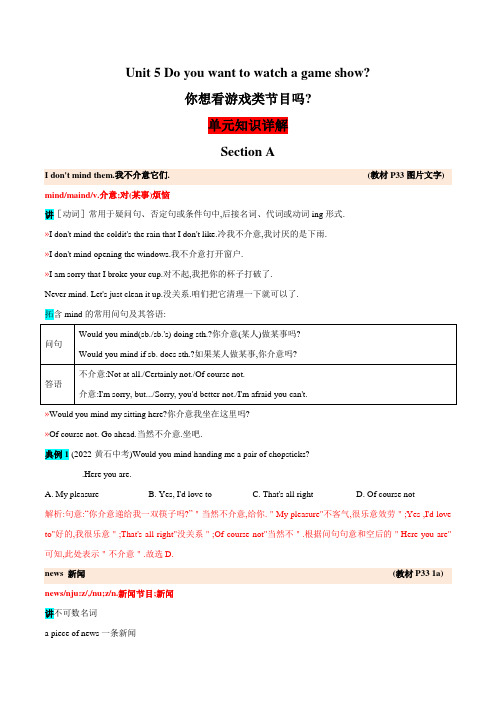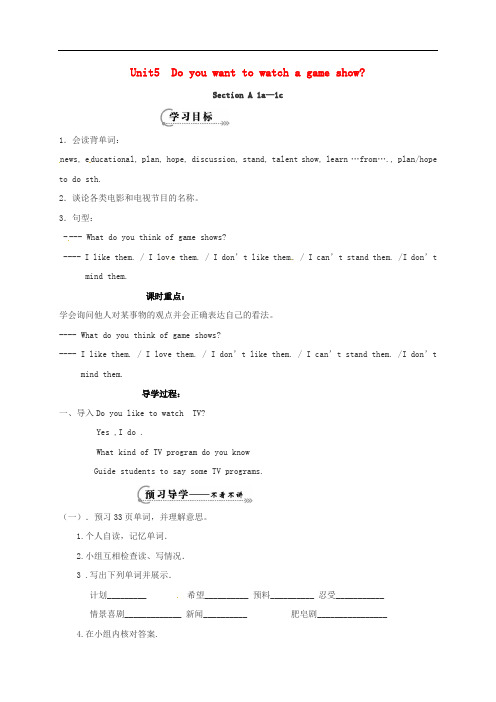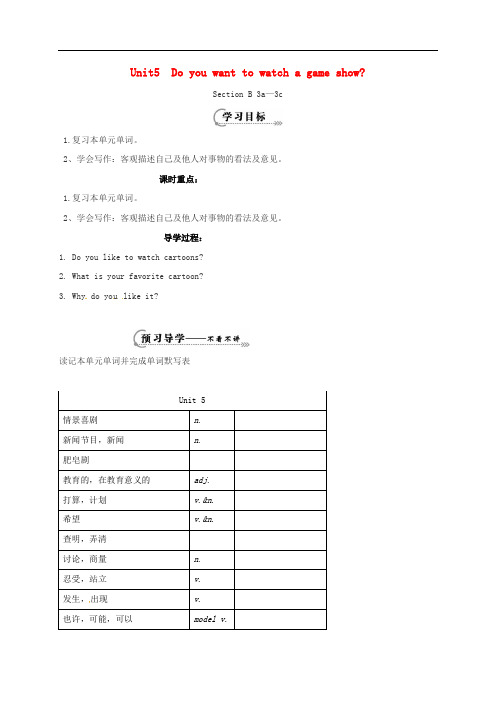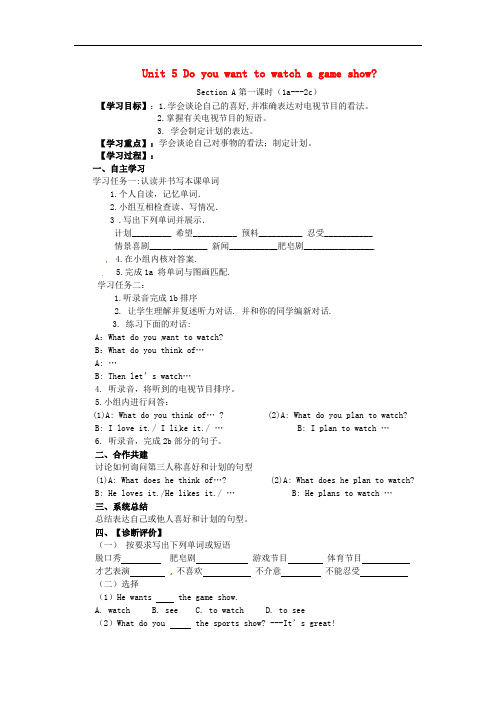U5do you want to watch a game show非常好的课件
- 格式:ppt
- 大小:3.02 MB
- 文档页数:33

Unit 5 Do you want to watch a game show?你想看游戏类节目吗?单元知识详解Section AI don't mind them.我不介意它们. (教材P33图片文字) mind/maind/v.介意;对(某事)烦恼讲[动词]常用于疑问句、否定句或条件句中,后接名词、代词或动词ing形式.»I don't mind the coldit's the rain that I don't like.冷我不介意,我讨厌的是下雨.»I don't mind opening the windows.我不介意打开窗户.»I am sorry that I broke your cup.对不起,我把你的杯子打破了.Never mind. Let's just clean it up.没关系.咱们把它清理一下就可以了.拓含mind的常用问句及其答语:»Would you mind my sitting here?你介意我坐在这里吗?»Of course not. Go ahead.当然不介意.坐吧.典例1 (2022·黄石中考)Would you mind handing me a pair of chopsticks?________ .Here you are.A. My pleasureB. Yes, I'd love toC. That's all rightD. Of course not解析:句意:“你介意递给我一双筷子吗?”"当然不介意,给你."My pleasure"不客气,很乐意效劳";Yes ,I'd love to"好的,我很乐意";That's all right"没关系";Of course not"当然不".根据问句句意和空后的"Here you are"可知,此处表示"不介意".故选D.news 新闻(教材P33 1a) news/nju:z/,/nu;z/n.新闻节目;新闻讲不可数名词a piece of news一条新闻watch the news观看新闻节目拓[不可数名词]消息谚No news is good news.没有消息就是好消息.»Good news! The Shenzhou X/ manned spacecraft has been sent into space successfully.好消息!神舟十四号载人飞船已被成功送入太空.特别提醒newspaper[可数名词]报纸a daily newspaper 日报a morning/an evening newspaper 早/晚报语境串记Have you read the news in the newspaper?你在报纸上读过这则新闻吗?can't stand 不能忍受(教材P33 1c) stand/stænd/v.忍受;站立讲(1)[动词]忍受常与can/can't/could/couldn't连用.常用结构有:can't stand sb./sth.不能忍受某人/某事can't stand(sb.)doing sth.不能忍受(某人)做某事»If you can't stand the heat, get out of the kitchen.你如果应付不了就别干了.»I can't stand sitting there and doing nothing.我受不了坐在那里无所事事.(2)[动词]站立»She was too weak to stand.她虚弱得站都站不住.拓[动词]位于(某处)»An old apple tree once stood here.这儿曾经长了一棵老苹果树.Sally thinks game shows are more educational than sits,萨莉认为游戏类节目比情景喜剧更有教育意义. (教材P34 2b) educational/ed3u'keifənl/adj.教育的;有教育意义的讲由"education(n.教育)+al(后缀,意为“与······有关的”)"构成.其比较级和最高级形式分别为more educational 和most educational.educational的发音以元音音素开头,其前加不定冠词时要用an.»It is the most educational experience I have ever had.这是我有过的最有教育意义的经历.»Cuore is an educational book.《爱的教育》是一本有教育意义的书.拓与educational相关的词:educate v.教育;教导educator n.教育工作者;教师educational adj.教育的; 有教育意义的education n.教育语境串记My mother is an educator. She always lets us read some educational books and educates us to pay more attention to education.我妈妈是一位教育工作者.她总是让我们看一些有教育意义的书,教导我们多关注教育.She plans to watch Days of Our Past tonight.今晚她打算看《我们过去的日子》. (教材P34 2b) plan/plæn/v.&n.打算;计划讲(1)[动词](此处用法) plan to do sth.计划/打算做某事»The government plans to create more jobs for young people in western China.政府计划为中国西部的年轻人创造更多的就业机会.(2)[可数名词]make a plan 制订计划谚The plan for a year lies in spring.一年之计在于春.»Make a plan and stick to it.制订计划并坚持下去.Because I hope to find out what's going on around the world.因为我希望了解世界上正在发生的事情.(教材P34 2c) hope/həʊp/v.&n.希望讲(1)[动词](此处用法)辨hope与wish两者都可作动词,表示"希望",具体用法区别如下:(2)[名词]谚Where there's life, there's hope.留得青山在,不怕没柴烧.»She has high hopes of winning.她抱着必胜的信念.拓"I hope so"(我希望如此)和"I hope not"(我希望不会)可用作简略答语.»Do you think the rain will stop soon?你认为雨很快就会停吗?I hope so.我希望如此.find out 查明;弄清辨look for, find与find out语境串记I looked for my pen everywhere, but I couldn't find it. I want to find out who took it away.我到处找我的钢笔,但没找到.我想弄清楚是谁拿走了它.拓"动词+out"型的其他短语;leave out 不包括set out出发go out 熄灭run out 用光;耗尽put out 扑灭take out 取出look out当心work out 解决;算出hand out 分发give out 分发;散发典例2(滨州中考)Pan Jianwei has bee a famous scientist. When he was a child, he liked to________ how things worked.A. set outB. find outC. leave outD. bring out解析:句意;潘建伟成了一位著名的科学家.当他还是个孩子的时候,他就喜欢探索事物是如何运作的.由语境可知应选B.We had a discussion about TV shows.我们进行了一次关于电视节目的讨论. (教材P34 2d) discussion/dɪ'skʌʃn/ n.讨论;商量讲由"discuss(v.讨论)+ion(名词后缀)"构成,其常用结构有:have a discussion with sb.和某人讨论have a discussion about sth.就某事展开讨论under discussion 在讨论中»Could I have a discussion with my classmates first?我能先和我的同班同学讨论一下吗?»We had a discussion about the basketball game yesterday.昨天我们就这场篮球比赛展开了讨论.»The plan is still under discussion.计划还在讨论中.典例3根据句意及汉语提示填空.(2022·镇江中考)After a heated________ (讨论),the headmasters from different schools reached an agreement(协议).解析:句意:经过激烈的讨论,来自不同学校的校长达成了协议.根据空前的a可知,此处应用可数名词单数;表示"讨论"应用discussion.故填discussion.I like to follow the story and see what happens next.我喜欢跟随故事情节,看看接下来会发生什么事情.(教材P34 2d) happen/'hæpən/v.发生;出现讲[不及物动词]常见用法:sth. happens to sb.某人发生某事sth. happens+时间状语/地点状语某时/某地发生某事»What happened to Robert?罗伯特怎么了?He fell down from the tree and hurt his left leg.他从树上掉了下来,摔伤了左腿.»An accident happened in that street.那条街上发生了一起事故.辨happen 与take place拓[动词]碰巧,恰好常见用法有:sb. happens to do sth.某人碰巧做某事It happens that...碰巧······»On my way to school, I happened to see an old man lying on the ground and helped him to hospital.上学路上,我碰巧看到一位老人躺在地上,就帮忙把他送到了医院.»It happened that I was out when he called.他打时我碰巧出去了.Well, they may not be very exciting, but you can expect to learn a lot from them.嗯,它们或许没那么令人兴奋,但是你可以期望从中学到很多东西. (教材P34 2d) expect/ik'spekt/v.预料;期待讲常见用法有:expect sth./sb.等待某事/某人expect to do sth.预料会/期望做某事expect sb.to do sth.预料/期待某人做某事expect+(that)从句预料······»I was expecting him yesterday.我昨天一直在等他.»You can't expect to learn a foreign language well in a few months.你不要期望在几个月内就能学好一门外语. »He just expects his children to e and stay with him.他只是期待他的孩子能来和他待在一起.»There's the doorbellI expect it'll be my mother,有人按门铃,估计是我妈妈.典例4(青岛中考)Teachers expect all their students________ progress day by day.A, to make B. make C. to take D. take解析:expect sb.to do sth.意为"期待某人做某事”,为固定结构,先排除B、D两项;make progress意为"取得进步",为固定搭配.故选A.I hope to be a TV reporter one day.我希望有一天能成为一名电视台记者. (教材P342d) one day有朝一日;某一天辨one day 与some day»One day last month the temperature was up to 30℃,上个月有一天气温达到了30摄氏度.»We will all be old one/some day,总有一天我们都会老去.You can learn some great jokes.你可以学到一些很棒的笑话. (教材P35 Grammar Focus) joke/dʒəʊk/n.笑话;玩笑讲[可数名词]常用短语:tell a joke/jokes 讲笑话play a joke/jokes on sb.开某人的玩笑»Jim is a funny boy. He is good at telling jokes.吉姆是个有趣的男孩.他擅长讲笑话.»We played a joke on John just now.我们刚才和约翰开了个玩笑.拓[动词]开玩笑同义词为kid.»Are you joking/kidding?你在开玩笑吗?典例5用括号中所给词的适当形式填空.(2023·上海市宝山区期中)Steven is very humorous(幽默的),He always tells_______ (joke) and makes people laugh.答案:jokesSection Bmeaningless 毫无意义的(教材P36 1a) meaningless/'m i:nɪŋləs/ adj.毫无意义的;意思不明确的讲由"meaning(n.意思)+less(形容词后缀)"构成.»He felt that his work was meaningless.他觉得他的工作毫无意义.»This article is meaningless to me.对我来说,这篇文章晦涩难懂.语境串记I know your meaning. You mean that staying at home all day long is meaningless and that looking for a job is meaningful.我懂你的意思.你的意思是整天待在家里毫无意义,找一份工作才是有意义的.词缀学习less是常见的形容词后缀,常加在名词后,表示"无;没有".homeless(无家可归的) hopeless(无望的) careless(粗心的) useless(无用的)典例1 用括号中所给词的适当形式填空.My father thinks it is_______ (meaning) to watch soap operas, so he never watches them.解析:句意:我爸爸认为看肥皂剧毫无意义,所以他从来不看.根据"so he never watches them"和提示词"meaning"可推断,此处应填meaningless.But one very famous symbol in American culture is a cartoon.但是在美国文化里一个非常著名的标志是卡通片. (教材P37 2b) famous/'ferməs/adj.著名的;出名的讲可在句中作定语或表语.»He went to a famous university after senior high school.高中毕业后,他上了一所著名的大学.(作定语)»The Great Wall is very famous around the world.长城在全世界都很出名.(作表语)辨be famous as, be famous for 与be famous to语境串记Edison is famous as an inventor in the world, and he is famous for his inventions. He is famous to the people all over the world.爱迪生作为一个发明家而闻名于世,他因他的发明而闻名.他为全世界的人所熟知.典例2 (2023·石家庄市第二十八中学期中)Why is this restaurant so popular?Because it is famous________ its nice food.A. forB. asC. toD. in解析:句意:"为什么这家餐馆如此受欢迎?”"因为它以美味的食物而闻名."此处表示这家餐馆受欢迎的原因,应用be famous for.故选A.Over 80 years ago, he first appeared in the cartoon Steamboat Willie.80 多年前,他首次出现在卡通片《威利号汽船》中. (教材P37 2b) appear/ə'pɪə/,/ə'pɪr/v.出现»More than 2,000 years ago, Tianlü, the first environmental protection law, appeared in Qin. 2000多年前,秦代出现了第一部环境保护法《田律》.拓与appear相关的词:appear v.出现反义词disappear v.消失appearance n.出现反义词disappearance n.消失»His sudden appearance surprised me.他的突然出现使我感到惊讶.»The plane disappeared behind clouds,飞机消失在云层里.典例3用括号中所给词的适当形式填空.(临沂中考)We should protect the endangered (濒危的)wild animals, or they will________ (appear) in the near future.解析:句意:我们应该保护濒危的野生动物,否则它们将在不久的将来消失.appear意为"出现",此处应填其反义词disappear(消失).When this cartoon came out in New York on November 18,1928...这部卡通片于1928年11月18日在组约上映·····(教材P37 2b)e out 出版;发行;发表»The medical book Tian Hui Yi Jian by Bian Que and Cang Gong has e out.扁鹊和仓公所著的医书《天回医简》已经出版了.»When is his new novel ing out? 他的新小说何时出版?拓e out的其他常见含义:»When the sun goes down, the stars e out.当太阳落山的时候,星星出现了.»Every flower will e out.每朵花都会绽放.»There is no doubt that the truth will e out one day.毫无疑问,总有一天会真相大白.He became very rich and successful.他(因此)变得非常富有和成功. (教材P37 2b) bee/bɪ'kʌm/v.开始变得;变成讲[系动词]后常接名词、形容词作表语.»Wang Yaping bees the first female taikonaut to work in China's space station.王亚平成为第一位在中国空间站工作的女性航天员.»Thanks to the highspeed trains, our journey time bees much shorter now.多亏了高铁,我们的旅程时间现在变得短多了.rich/rɪtʃ/adj.富有的讲[形容词]富有的(此处用法)the rich 表示"富人",其作主语时,谓语动词用复数形式.»She es from a rich family,她来自一个富裕的家庭.谚A snow year, a rich year.瑞雪兆丰年.»The rich are not always happy.富人并不总是快乐的.拓rich作形容词的其他含义:»She lives a rich and varied life.她过着丰富多彩的生活.»Canada is rich in water resources.加拿大水资源丰富.»Vegetables grow well in the rich soil.蔬菜在肥沃的土壤里长得好.»Eating rich food makes people get fat easily.吃油腻的食物很容易让人长胖.successful/sək'sesfl/adj.获得成功的;有成就的讲"success(n.成功)+ful(形容词后缀)"构成.be successful in(doing)sth.在(做)某事上成功»To live with a high ideal is a successful life.怀着崇高的理想生活,就是成功的人生.»They were successful in winning the match.他们成功赢得了那场比赛.拓与successful 相关的词:succeed v.成功success n.成功successful adj.获得成功的successfully adv.成功地succeed in doing sth. 成功做某事»Confidence is the key to success.信心是成功的关键.»You'll succeed in learning all kinds of interesting things.你会学到各种有趣的东西.»She has already successfully pleted these courses.她已经成功完成了这些课程.典例4(盐城中考)You need not only talent but also hard work to bee a_______ football player.A. youngB. successfulC. happyD. friendly解析:句意;要成为一名成功的足球运动员,你不仅需要天赋,还需要努力训练.根据句意可知选B.In the 1930s,he made 87 cartoons with Mickey.在20世纪30年代,他制作了87部米奇卡通片. (教材P37 2b) in the 1930s 在20世纪30年代讲"in the+整十年份s/'s"表示"在····世纪······年代”.当年份为100的整数倍时,表示“在······世纪”.»in the 1980s/1980's在20世纪80年代»in the1900s在20世纪Some people might ask how this cartoon animal became so popular.一些人可能会问这个卡通动物是如何变得如此受欢迎的. (教材P37 2b) might/mait/ modal v.可能;可以讲本身即可作情态动词,也可作may的过去式.具体用法有:(1)表示不太肯定的推测,比may语气弱.»Tom might be in the library, but I'm not sure.汤姆可能在图书馆,但我不确定.(2)用于有礼貌地提出建议或提出请求,比may语气委婉.»You might set out early.你可以早点儿出发.»Might I use your pen?我可以用你的钢笔吗?典例5 (2022·怀化中考)Whose English book is this?It_______ be Lily's, but I'm not sure.A. mightB. can'tC. must解析:句意:"这是谁的英语书?”"它可能是莉莉的,但我不确定."根据题干中的"but I'm not"可知,此处表示不太肯定的推测.might"可能",can’t"不可能",must"必须".故选A.One of the main reasons is that Mickey was like a mon man, but he always tried to face any danger.其中一个主要原因是米奇就像一个普通人,但他总是尽力面对任何危险. (教材P37 2b) main/mein/adj.主要的;最重要的讲[形容词]无比较等级,只能用在名词前作定语.»The Monkey King or Sun Wukong is one of the main characters in Journey to the West.美猴王/孙悟空是《西游记》的主角之一.拓mainly[副词]主要地;大部分地»There are mainly six kinds of tea in China.中国主要有六种茶.reason/'ri:zn/n.原因;理由讲常见搭配有:the reason why....·····的原因for some/this reason 出于某种/这个原因have a/no reason for doing sth.有/没有理由做某事»Do you know the reason why she was late this morning?你知道今天早上她迟到的原因吗?»Tell him or her that you can't be there for some reason.告诉他/她由于某种原因你不能去那儿.»We have no reason for not finishing the homework.我们没有理由不完成家庭作业.mon/'kpmən/,/'ka:mən/adj.普通的;常见的讲[形容词]普通的;常见的»With the development of technology, space travel will be a mon thing.随着技术的发展,太空旅行将成为一件普通的事情.»Making mistakes in class is mon to all, so be brave to face it.在课堂上犯错对所有人来说都很常见,所以勇敢面对吧.拓(1)mon[形容词]共有的»He and I share a mon interest in collecting stamps.我和他在集邮方面兴趣相投.(2)have sth. in mon(with sb.)(与某人)有·····共同之处»All the mothers have one thing in mon: Full love in their eyes, bright light in their hearts.所有的母亲都有一个共同点:眼中充满爱,心中充满光.In his early films, Mickey was unlucky and had many problems such as losing his house or girlfriend, Minnie.在米奇早期的电影里,他是不幸的,他遇到了许多问题,比如失去他的房子或者女朋友米妮. (教材P37 2b) unlucky/ʌn'lʌki/adj.不幸的;不吉利的讲由"否定前缀un+lucky(adj.幸运的)"构成.发音以元音音素开头,其前的不定冠词应用an.»He was unlucky to lose the match.他很不幸地输掉了比赛.»In some Western countries, people think 13 is an unlucky number.在一些西方国家,人们认为13是个不吉利的典例6 用所给词的适当形式填空.(2022,陕西中考A卷改编)At the age of 14, something_______ (lucky) happened to Jia Shuangdeng and turned him into a deaf person.答案:unluckylose/lu:z/v.失去;丢失常用短语有:lose touch with sb.和某人失去联系lose one's way 迷路lose weight 减肥lose heart 失去信心lose one's life 丧生»My father lost his keys yesterday morning.昨天早上我爸爸把他的钥匙弄丢了.»He lost his way in the forest.他在森林里迷路了.拓[动词]输掉其反义词为win"获胜,赢".»He lost the game so he was sad.他输掉了比赛,所以他很伤心.However, he was always ready to try his best.然而,他总是准备好尽其所能. (教材P37 2b)be ready to do sth.准备好做某事;愿意做某事讲相当于get ready to do sth..»We're ready to go.我们准备好了,可以走了.»I will be ready to help you.我很乐意帮助你.拓be/get ready for sth.为某事做好准备»Are you ready for your school trip?你为学校旅行做好准备了吗?try one's best 尽某人最大努力讲相当于do one's best.try/do one's best to do sth.尽某人最大努力做某事»Your dream will e true if you try your best.如果你尽最大努力,你的梦想就会实现.»We should try our best to improve handwriting.我们应该尽我们最大努力改善书写.On November 18,1978,Mickey became the first cartoon character to have a star on the 年11月18日,米奇成为第一个在好莱坞星光大道上拥有一颗星星的卡通角色. (教材P37 2b)动词不定式(短语)作后置定语讲动词不定式(短语)修饰名词时,通常放在名词的后面,作后置定语.»He is the best man to do the job.他是做这份工作的最佳人选.»They're looking for a place to live.他们正在寻找一个住处.She dresses up like a boy and takes her father's place to fight in the army.她打扮成男孩模样,替父从军打仗.(教材P39 3a) dress up 装扮;乔装打扮讲dress up like/as+表示角色或职业等的名词装扮成·····»Kids love dressing up.孩子们喜欢装扮成别人玩儿.»I think it's fun to dress up like/as a cartoon character.我觉得装扮成卡通人物很好玩.拓穿上盛装;穿上正装»You don't need to dress up for dinner.你们不必穿上盛装赴宴take sb.'s place 代替;替换»The boss found someone to take Jenny's place(=take the place of Jenny),老板找了个人来代替珍妮.拓in sb.'s place 处于某人的境况相当于in sb.'s shoes.»What would you do if you were in my place(=in my shoes)?你要是处于我的境地会怎么办?The other actors are also fantastic and they did a good job in the movie.其他演员也非常出色,他们在电影中都表现得很好. (教材P39 3a) do a good job干得好讲常用来夸奖他人在某方面做得好.»I believe you can do a good job.我相信你们能做得很好. 拓Good job!/Well done!干得好!常用于口语中.»I finished the task on time.我按时完成了任务.Good job!/Well done!干得好!。

Unit5 Do you want to watch a game show?一、重点短语1、think of = think about 认为What do you think of (=how do you like )this movie?What does your father think of his boss?How about doing…?做……怎么样?2、I don’t mind them. 我不介意他们。
mind: n 头脑、想法change one’s min d变化主意make up one’s mind 下决心mind: v介意;在意;反对。
多用于如下句型:(表达祈求或征求意见)Would you mind doing …?Would you mind opening the door?Do you mind …? Do you mind my dog?3、I can’t stand it! 我不能忍受它/我受不了它!stand: 顺利接受;忍受(多用于否认句、疑问句)4、I do, too. / I don’t, either. 我也… / 我也不…too 与either旳区别:too“也”,表达肯定意义,与肯定旳体现措施连用;而either “也不”,表达否认意义,与否认旳体现措施连用。
--My brother likes to play soccer. ?I do, too.--My brother doesn’t like to play soccer. ?I don’t, either.5、a thirteen-year-old boy 一种十三岁旳男孩。
此构造中,year 用单数形式,且用连字符,类似旳构造尚有:five-month-old baby 五个月大旳婴儿试比较:He is a student. He is thirteen years old.He is a thirteen-year-old student.6、hair clip 发卡有关hair旳其他几种常见短语:hair band 发带, hair cut发型,发式;剪发(名词), hair dresser 剪发师7、happenSth happen +时间/地点某时某地发生了什么Sth happen to sb 某人出了某事(不好旳事情)Sb happen to do sth 某人碰巧做某事It happened that 碰巧发生某事8、be famous/well-known for因什么而出名Be famous/well-known as 作为何而出名as famous as与……同样有名9、dress up 盛装打扮dress sb up/dress uo sb.盛装打扮某人dress sb /oneself 给某人穿衣服get dressed 穿衣服put on 穿衣服(强调动作)wear穿衣服(强调状态)10、take one’s place替代=take the place of sb.11、learn from从……获得;向……学习12、find out查明;弄清晰13、talk show谈话节目game show游戏节目soap opera肥皂剧14、go on发生watch a movie看电影 a pair of一双;一对15、have a discussion about就……讨论16、one day有一天17、such as例如18、do a good job干得19、something enjoyable令人快乐旳东西20、interesting information有趣旳资料21、around the world全世界22、a symbol of……旳象征23、look强调看旳动作,接宾语时要加atSee强调看旳成果,尚有看望,明白等意思Watch一般精力比较集中,如看电视、演出、球赛等watch the football game二、动词不定式做宾语let sb. do sth.让某人做某事plan to do sth.计划/打算做某事hope to do sth.但愿做某事happen to do sth.碰巧做某事expect to do sth.期望做某事be ready to do sth.乐于做某事try one’s best to do sth.竭力做某事一、有些动词只能接不定式做宾语。

Unit5 Do you want to watch a game show?Section A 1a—1c1.会读背单词:news, e ducational, plan, hope, discussion, stand, talent show, learn …from…., plan/hope to do sth.2.谈论各类电影和电视节目的名称。
3.句型:---- What do you think of game shows?---- I like them. / I lov e them. / I don’t like them. / I can’t stand them. /I don’t mind them.课时重点:学会询问他人对某事物的观点并会正确表达自己的看法。
---- What do you think of game shows?---- I like them. / I love them. / I don’t like them. / I can’t stand them. /I don’t mind them.导学过程:一、导入Do you like to watch TV?Yes ,I do .What kind of TV program do you knowGuide students to say some TV programs.(一).预习33页单词,并理解意思。
1.个人自读,记忆单词.2.小组互相检查读、写情况.3 .写出下列单词并展示.计划_________ 希望__________ 预料__________ 忍受___________情景喜剧_____________ 新闻__________ 肥皂剧________________4.在小组内核对答案.5.完成1a 将单词与图画匹配.(二)预习检测1.同桌互相提问短语。
2.把1a词组译成汉语。

人教新目标版英语八上Unit 5《Do you want to watch a game show》精美说课稿一. 教材分析人教新目标版英语八上Unit 5《Do you want to watch a game show》是一篇关于电视节目的对话课文。
本节课主要围绕“看电视”这一主题,通过学习对话,让学生掌握情态动词“want to”的用法,以及表达自己喜好和观看电视节目的常用句型。
同时,本节课还涉及到一些关于电视节目的词汇,如game show, sitcom, news等。
二. 学情分析八年级的学生已经掌握了基本的英语语法和词汇,具备一定的听说读写能力。
他们对电视节目有一定的了解,能表达自己的喜好。
但部分学生在口语表达时仍存在一定的困难,对某些电视节目词汇的掌握不够熟练。
因此,在教学过程中,教师需要关注学生的个体差异,调动他们的积极性,提高他们的口语表达能力。
三. 说教学目标1.知识目标:学生能熟练掌握情态动词“want to”的用法,以及表达自己喜好和观看电视节目的常用句型。
2.能力目标:学生能在日常生活中运用所学知识,与他人交流自己喜欢的电视节目。
3.情感目标:培养学生热爱生活,关注休闲娱乐的意识,提高他们的审美品味。
四. 说教学重难点1.重点:情态动词“want to”的用法,以及表达自己喜好和观看电视节目的常用句型。
2.难点:部分电视节目词汇的掌握,以及如何在实际情境中运用所学知识。
五. 说教学方法与手段1.教学方法:采用任务型教学法,情境教学法,分组合作学习法等。
2.教学手段:利用多媒体课件,图片,卡片等辅助教学。
六. 说教学过程1.导入:教师通过提问学生喜欢的电视节目,引导学生谈论话题,激发兴趣。
2.新课呈现:教师展示课件,呈现本节课的主要内容,让学生初步感知。
3.讲解与练习:教师讲解情态动词“want to”的用法,以及表达自己喜好和观看电视节目的常用句型。
学生进行分组练习,巩固所学知识。

Unit5 Do you want to watch a game show?Section B 3a—3c1.复习本单元单词。
2、学会写作:客观描述自己及他人对事物的看法及意见。
课时重点:1.复习本单元单词。
2、学会写作:客观描述自己及他人对事物的看法及意见。
导学过程:1. Do you like to watch cartoons?2. What is your favorite cartoon?3. Why do you like it?读记本单元单词并完成单词默写表发生,出现n.小组学习3a1、组长带领阅读3a方框里的单词并明确其含义,写出汉语。
fantastic shows action want comesfrom played about like excitin g plan2、组长带领阅读3a课文并明确短文大意。
3、完成空格内容。
4、核对答案。
导学测评:补全对话A:What day i s it today? B:__________Saturday.A:Do you _____________to go to a movie? B: ___________,I do.A:_____________ __kind _______ movies do you like?B: I like action _____________.I ____________it's _____________.A: Good! Let's see __________action movie.B:That sound s ____________________.单项选择( ) 1. -- ______ do you like it? --- Very much.A. HowB. WhatC. WhyD. When( ) 2. --- What ____ she think of the book? ---- She loves it.A. doB. isC. wasD. does( ) 3. I like soap operas, she likes ______, too.A. itB. theyC. themD. the ones( ) 4. Do you mind _______ the windows?A. to openB. opensC. openingD. opened翻译句子.1.有关音乐方面的东西,我学到了许多。

Unit 5 Do you want to watch a game show?Section A第一课时(1a---2c)【学习目标】:1.学会谈论自己的喜好,并准确表达对电视节目的看法。
2.掌握有关电视节目的短语。
3. 学会制定计划的表达。
【学习重点】:学会谈论自己对事物的看法;制定计划。
【学习过程】:一、自主学习学习任务一:认读并书写本课单词1.个人自读,记忆单词.2.小组互相检查读、写情况.3 .写出下列单词并展示.计划_________ 希望__________ 预料__________ 忍受___________情景喜剧_____________ 新闻___________肥皂剧________________4.在小组内核对答案.5.完成1a 将单词与图画匹配.学习任务二:1.听录音完成1b排序2. 让学生理解并复述听力对话. 并和你的同学编新对话.3. 练习下面的对话:A:What do you want to watch?B:What do you think of…A: …B: Then let’s watch…4. 听录音,将听到的电视节目排序。
5.小组内进行问答:(1)A: What do you think of… ? (2)A: What do you plan to watch? B: I love it./ I li ke it./ … B: I plan to watch …6. 听录音,完成2b部分的句子。
二、合作共建讨论如何询问第三人称喜好和计划的句型(1)A: What does he think of…? (2)A: What does he plan to watch? B: He loves it./He likes it./ … B: He plans to watch …三、系统总结总结表达自己或他人喜好和计划的句型。
四、【诊断评价】(一)按要求写出下列单词或短语脱口秀肥皂剧游戏节目体育节目才艺表演不喜欢不介意不能忍受(二)选择(1)He wants the game show.A. watchB. seeC. to watchD. to see(2)What do you the sports show? ---It’s great!A. thinkB. likeC. think ofD. look like(3)I the sitcom. It’s too long.A. likeB. don’t mindC. can’t standD. love(4)Can you help me what time the train leaves?A. find outB. look forC. watchD. see(5)I like watching news. I want to know what is around the world.A. go onB. goes onC. going onD. went on(三)补全对话A. the game showB. don’t likeC. aroundD. think ofE. interestingA: It’s time for news! Turn on the TV!B: What do you 1 news?A: I think it’s important. It can tell me what is goi ng on 2 the world.B: I 3 it. I think it is too boring.A: What do you plan to watch?B: Game show. It’s 4 .A: Ok. Let’s watch 5 after the news.(四)翻译下列句子1.我每天晚上看新闻。
Unit 5 Do you want to watch a game show?一、单词及重点短语1.n.情景喜剧(= situation comedy)2.n.新闻;消息3.n.肥皂;肥皂剧4.adj.教育的;有教育意义的5.n.计划;方法v.打算;计划.6.;期望;盼望n.希望7..讨论;谈论8.v.站立;忍受9.vi.发生;碰巧;出现;偶遇10.aux.可以,能够;可能,也许11. v.预期;期待;盼望12. n.笑话;玩笑v.说笑话;开玩笑13. n.喜剧;滑稽;幽默事件14.查明、弄清15.adj.无意义的;不重要的16.n.行为;活动17.n.卡通;漫画18.n.栽培;文化;教养19.adj.著名的;有名的20.vi.出现;出版;显得21.v.变成;成为22.adj.富有的;富饶的;丰富的23.adj.成功的;圆满的24.aux.可能;也许;may的过去式25.adj.主要的;最重要的26.n.原因;理由27.n.电影28.adj.倒霉的;不幸的;不吉利的29.vt.丢失;失败vi.失败30.adj.准备好的;乐意的31.n.个性;品质;人物;32.adj.简单的;朴素的;单纯的;笨的33.n.军队;陆军;一大批34.动作片35.愿意迅速做某事36.装扮;乔装打扮37.代替;替换38.工作干得好;做得好认为从……获得;向……学习查明;弄清楚谈话节目游戏节目肥皂剧发生看电影一双;一对尽某人最大努力与……一样有名就……讨论有一天例如打扮;梳理代替;替换干得好令人愉快的东西有趣的资料…之一看起来像全世界…的象征二、句型集萃让某人做某事计划/打算做某事希望做某事碰巧做某事盼望做某事做……怎么样?乐于做某事 .尽力做某事课文重难点讲解Section A1. Do you want to watch a game show?【解析1】want =would like v 想要want a go = have a try 试一试(1) want sth 想要某物I want a pen.(2) want to do sth 想要去做某事I want to go home.(3) want sb to do sth = would like sb to do sth.想要某人做某事I really want __________________(去滑冰) today.【2014江苏盐城】69. The person who is the earliest will get what he or she _______(want).【2014苏州中考】The driver wanted___his car near the roadside but was asked by thepolice not to.A.ParkB. ParkedC. to parkD. parking【解析2】watch/read/see/look at “看”法不同(1)看电视、看比赛、看表演用watch; watch TV 看电视【2014重庆中考】27.—Where is your father?--He ________ the World Cup in the living room.A.is watchingB.watchesC.watchedD.will watch【2014江苏泰州】65. The TV program Super Brain(最强大脑)is so fantastic that it is well worth____ ( watch).(2)看书、看报、看杂志用read read the book看书(3)看电影、看医生用see see the doctor 看医生(4) 看黑板、看地图用look at look at the blackboard 看黑板【记】______the picture. Can you see the man in the picture? He isn’t ________ the book.He is ______TV.( ) ____ the board , child! Read the words on it after me.A. LookB. Look atC. SeeD. Watch【解析3】show ⑴v 出示,展示show sb. sth = show sth to sb. 向某人出示某物Lucy showed me her photos = Lucy showed the photos to me.show sb. around someplace 带领某人参观⑵n 演出;节目;表演be on show 正在展出fashion show 时装表演game show 游戏节目TV show 电视节目talent show才艺表演talk show 脱口秀;谈话节目sports show 体育节目( ) Zhang Xuan showed me her photos and gave me one yesterday.A. passed meB. brought meC. let me seeD. made me take【2014湖北武汉】38. I used to _______ with my wife and watch TV movies at home.A. show upB. wake upC. come upD. stay up2. —What do you think of talk show? 你认为访谈节目怎么样?—I don’t mind them . 我不介意它们。
Unit 5 Do you want to watch a game show?Section A 1 (1a-2c)一、教学目标:1. 语言知识目标:1) 能掌握以下单词:sitcom, news, soap, educational, plan, hope, find out, discussion, stand, happen, may, expect能掌握以下句型:① What do you want to watch?② What do you think of talk shows?③I can’t stand them.④I don’t mind them.⑤I like/love them. / I don’t like them.2) 能了解以下语法:动词不定式结构做动词的宾语;后面接动词不定式做宾语的动词。
3)学会陈述自己的看法;学会谈论自己的喜好。
2. 情感态度价值观目标:学会谈论流行文化,了解各类电视和电视节目的名称和自己的喜欢。
教育学生注意用眼卫生,学会保护眼睛。
二、教学重难点1. 教学重点:1) 学习掌握各类电视和电视节目的名称。
2) 熟悉句型What do you think of…?2. 教学难点:掌握动词不定式结构做动词的宾语;三、教学过程Ⅰ. Lead-in学生们视频《爸爸去哪儿》学习各类电视节目并且练习运用What do you think of…?Ⅱ. New wordsLearn the names of the TV shows.Ⅲ. Game1. 引导学生们看1a中的图片,根据提示依次说出每一部TV Show的名称。
2. 让学生们看图片及1a中的词汇,将图片与正确的词汇相连。
3. Check the answers with the Ss.Ⅳ. Listening1. T: Tell Ss to read the shows in the box.2. Play the recording for the Ss to listen and number the shows1-4.3. Play the recording again. Check the answers with the Ss.Ⅴ. Pair work1. Let Ss look at the pictures in the box. Then explain the meaning of each expression to the Ss.2. Let Ss read the conversation after the teacher. Then let Ss make their ownconversation using the shows and expressions in the box.3. Let some pairs ask and answer about the shows.Ⅵ. ListeningWork on 2a:1. Read the shows in the box of 2a. Tell Ss to remember the information.2. Play the recording for the Ss to listen and number the TV shows [1-5].3. Play the recording again to check the answers.Work on 2b:1. Let Ss read the sentences below. Explain some main sentences for the Ss. Make sure they know what to do.2. Play the recording for the Ss to write the correct words in the blanks.3. Play the recording again to check the answers.Ⅶ. Pair work1. Tell Ss ask and answer questions about the TV shows in 2a. They can use the information that is true for them.2. Let Ss read conversation after the teacher.3. Explain some main points for the Ss.4. Ss act the conversation in pairs. Ask some pairs to act out their conversations.Ⅷ. Role-play1. Read the conversation after the tape.2. Practice the conversation with their partner.3.Then let some pairs to act out the conversation.IX. Homework:1.try to know more about TV shows.2.finish the exercises on P49.板书:。